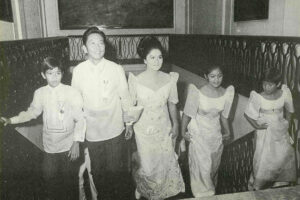Marcos presents evidence in ill-gotten wealth case

By John Victor D. Ordoñez, Reporter
PHILIPPINE President Ferdinand R. Marcos, Jr. has asked the country’s anti-graft court to consider the dismissal of several ill-gotten wealth lawsuits against his family in its appreciation of a similar case it is hearing now.
At a pre-trial hearing at the Sandiganbayan on Wednesday, his lawyers presented rulings in other cases that favored the family, including a December 2019 decision that rejected the state’s forfeiture case, Second Division Executive Clerk of Court Anne Marie D. Crespillo said by telephone.
“Mr. Marcos’ lawyers had marked eight cases as evidence and government prosecutors did not object to the submission,” she said. “Mr. Marcos basically rested his case at today’s hearing since he did not present any more evidence.”
The anti-graft court’s Fourth Division on July 22 affirmed the December ruling by dismissing the state’s lawsuit seeking to recover at least four Marcos properties in the absence of sufficient evidence that these had been illegally obtained.
The case covered the properties still within the Marcos family’s control, including a beach house, guest house and museum in Ilocos Norte province and a house in Manila, the capital.
The dismissal covers “properties that allegedly have not yet been recovered by the government,” according to a copy of the decision written by Justice Alex L. Quiroz uploaded on the court’s website.
“The pre-trial hearing is an important part of the civil case since the parties agree upon facts that do not need to be testified on in the subsequent trial,” Maria Teresa S. Pabulayan, a Sandiganbayan executive clerk of court, told BusinessWorld.
The Presidential Commission on Good Government (PCGG) filed the lawsuit in 1987, accusing business associates of the late dictator Ferdinand E. Marcos and his wife Imelda — Marcos Jr.’s parents — of acting as their dummies to acquire ill-gotten wealth using state funds.
The court last month allowed the Marcos family to present evidence, rejecting the government’s motion to waive the family’s right to present evidence.
“To allow the defendants to present their evidence and proceed with the trial of the case would be in furtherance of seeking the truth,” according to the ruling penned by Associate Justice Arthur O. Malabaguio.
The president’s family was originally set to present initial evidence at a hearing set for July 7, but the Sandiganbayan reset the proceedings for Aug. 5, during which the defense informed the court that they were no longer presenting new witnesses, Ms. Crespillo said.
Wednesday’s pre-trial hearing was the second. The Second Division set the next pre-trial conference for Sept. 1, she added.
A popular street uprising toppled the dictator’s regime in February 1986, forcing him and his family to flee into exile in the United States.
That same year, his successor, the late President Corazon C. Aquino created the PCGG to recover ill-gotten assets amassed by the Marcoses and his cronies during his two-decade reign, almost half of which was under martial rule.
After the dictator died in 1989 in Hawaii, the court ordered his heirs — Imelda, Marcos Jr. and his sisters Imee and Irene — to substitute for him in the case.
Political analysts have said an unfavorable judgment against the Marcoses could lead to a constitutional crisis since law enforcers are under the president.
A favorable judgment could also cause more allegations of using executive power to influence other institutions to protect himself and his family’s interests, Maria Ela L. Atienza, who teaches political science at the University of the Philippines, said on July 9.
In 2003, the Philippine Supreme Court awarded to the Philippine government $658 million (P36.6 billion) of the dictator’s frozen Swiss bank deposits. The court ruled only about $304,000 of the Marcos family’s income was lawful.
The Sandiganbayan Fourth Division on Dec. 29, 2019 dismissed the government’s forfeiture case against the dictator’s estate, only to partially grant the state’s motion for reconsideration on July 12 last year.
A sweeping dismissal of the entire complaint was unwarranted given that many of the properties covered by the suit have long been recovered by the government, it said.
Among the ill-gotten assets recovered by the government were shares in Philippine Long Distance Telephone Co. worth P25.2 billion, shares in Philippine Telecoms Investment Corp. worth P25.2 billion, several houses in Baguio City and 526 art pieces now under the custody of the Philippine central bank.




